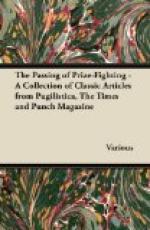A cellar I’d have quite complete
With wines, so recherche,
well stored;
And jovial guests often should meet
Round my social and well-garnish’d
board.
But I would have a favourite few,
To my heart and my friendship
more dear;
And I’d marry—I mustn’t
tell who—
If I had a thousand a-year.
With comforts so many, what more
Could I ask of kind Fortune
to grant?
Humph! a few olive branches—say
four—
As pets for my old maiden
aunt.
Then, with health, there’d be nought
to append.
To perfect my happiness here;
For the utile et duloc would blend.
If I had a thousand a-year.
* * * * *
MY UNCLE BUCKET.
The Buckets are a large family! I am one of them—my uncle Job Bucket is another. We, the Buckets, are atoms of creation; yet we, the Buckets, are living types of the immensity of the world’s inhabitants. We illustrate their ups and downs—their fulness and their emptiness—their risings and their falling—and all the several goods and ills, the world’s denizens in general, and Buckets in particular, are undoubted heirs to.
It hath ever been the fate of the fulness of one Bucket to guarantee the emptiness of another; and (mark the moral!) the rising Bucket is the richly-stored one; its sinking brother’s attributes, like Gratiano’s wit, being “an infinite deal of nothing.” Hence the adoption of our name for the wooden utensils that have so aptly fished up this fact from the deep well of truth.
There be certain rods that attract the lightning. We are inclined to think there be certain Buckets that invite kicking, and our uncle Job was one of them. He was birched at school for everybody but himself, for he never deserved it! He was plucked at college—because some practical joker placed a utensil, bearing his name, outside the door of the examining master, and our uncle Job Bucket being unfortunately present, laughed at the consequent abrasion of his, the examining master’s, shins. He was called to the bar. His first case was, “Jane Smith versus James Smith” (no relations). His client was the female. She had been violently assaulted. He mistook the initial—pleaded warmly for the opposing Smith, and glowingly described the disgraceful conduct of the veriest virago a legal adviser ever had the pain of speaking of. The verdict was, as he thought, on his side. The lady favoured him with a living evidence of all the attributes he was pleased to invent for her benefit, and left him with a proof impression of her nails upon his face, carrying with her, by way of souvenir, an ample portion of the skin thereof. Had the condensed heels of all the horses whose subscription hairs were wrought into his wig, with one united effort presented him with a kick in his abdominals, he could not have been more completely “knocked out of time” than he was by the mistake of those cursed initials. “What about Smith?” sent him out of court! At length he




